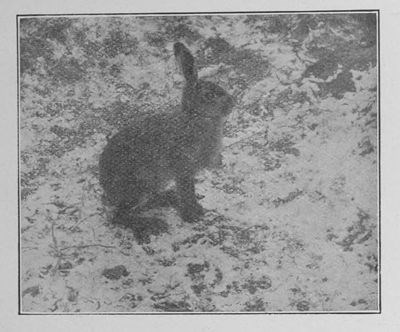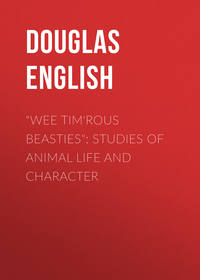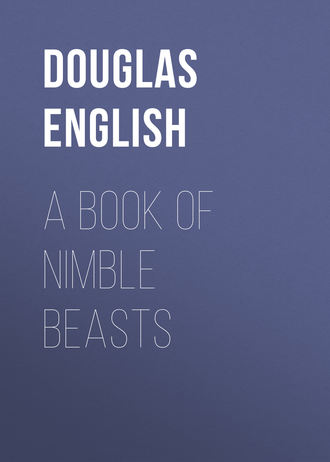 полная версия
полная версияA Book of Nimble Beasts
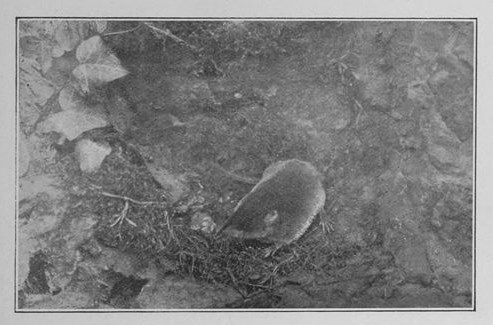
He took the Right-hand Surface-run
The Pygmy sprang up after them. He is the burrows' jackal, and takes an interest in serious fights. Once on the level ground he paused, made three small casts, then took the right-hand surface-run.
He was quite right; the combatants had passed that way. It was a zigzag run, but unimpeded. A drooping grass-stem tangle formed its roof, and, through long use, its sides were brown and withered, as though some noxious snake had glided through, and poisoned every growing blade it touched. The Pygmy knew it end to end, and knew that, where it broke, close to the elm, there was a moss-grown clearing. So he took matters quietly, and, lingering as the fancy took him, had supped before he reached the fighting-ground. The common shrews were feinting for an opening. He knew them both by sight. One, a brown-coated, thick-set scaramouch was neighbour to him in the stump. The other was a meadow-shrew, of lighter build and colour, but longer and full match in weight. The Pygmy rubbed his nose between his paws—a pretty fight was promised.
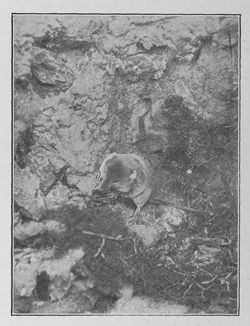
He could See as well as Hear
And others seemed to have got wind of it. The grass-stems flicking to and fro betrayed them. On every side he heard short, fluttery mouse-steps. Above he caught shrill squeaks and whimperings; a bat was busy with the filmy moths. Below the ground seemed shivery—that was the mole. The Pygmy heard and scented him. He crawled discreetly up the trunk, and so could see as well as hear. In the green tangle round were flitting specks—the voles and mice assembling in hot haste. From these his eye passed to the combatants. The grey shrew's ear was torn, and from it hung one drop of blood. This was the lodestone.
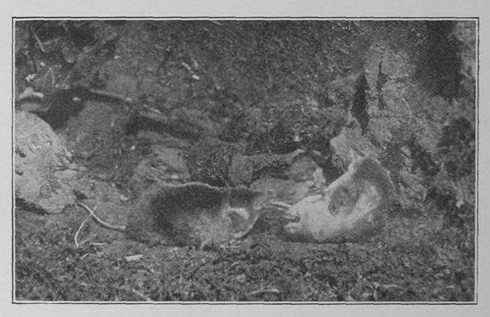
His Rival, feinting, flicked his Tail too Far, and, in a twinkle, it was seized
Up from a moss-clump shot a woodmouse nose, and, at the back of it, two round black eyes looked murder. The Pygmy caught the chatter-grince of teeth; the bat still threaded needle-notes among the leaves; the leaves themselves were whispering; but clear above these short, crabbed, fretful sounds, he heard the steady rumble of the mole. The thing perplexed him. Could the expectant ring of mice be deaf? The pair that held the stage were too absorbed to notice anything.
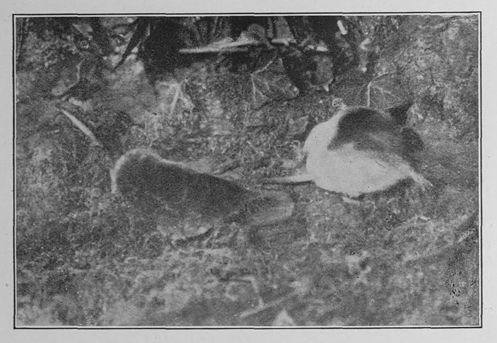
The Grey Shrew leant against the Trunk and panted
The brown shrew lay half sideways fronting him
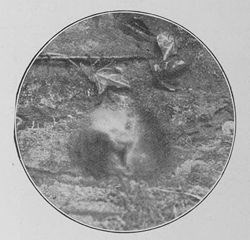
With Tangled Tails and rounded Straining Bodies, commenced to Spin
It was the brown shrew who got home the first. His rival, feinting, flicked his tail too far, and, in a twinkle, it was seized. The grey shrew swung himself upon his back, and kicked with all four paws. But this was waste of strength. The shrewmouse has forked teeth, teeth that will hold a slippery rounded beetle, much more a soft square tail. So with necessity the spur of valour, he twisted round and nipped the brown shrew's foot. Both straightway bit their hardest; the twinge made both give way. They toppled backwards squealing. The grey shrew leant against the trunk and panted; the brown shrew lay half sideways fronting him, and, on all sides, the ring broke into chatterings. The Pygmy, trembling with delight, screamed out encouragement, but no one heard his screams. The bat dived headlong from the leaves, skimmed in between them and shot up once more. The woodmouse crept two paces forward, then backed abruptly, for they were at grips. Each nipped a loose flap of the other's skin, and, bracing all four feet, tugged at its prize. They tugged until they toppled sideways; then with claws fastened in each other's fur, with tangled tails and rounded straining bodies, commenced to spin.

That is the way of shrewmice, much pother and slight wounds. Their fights are seldom mortal. Rather, they die for want of fighting. Their valiant souls misfit them.
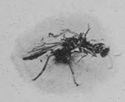

So this hot-blooded, strenuous pair spun as one living ball across the ring, over and over, twist and twirl, upside and down, faster and faster, until the spin itself released them. Then they sat back from one another and wobbled like spent tops.
The third round started dully. The brown shrew, shaken with exertion, lay on his back the better to refresh himself. The grey shrew, just as weary, crept to an eminence above and eyed him wickedly. The ring was all impatience.
Both soon revived.
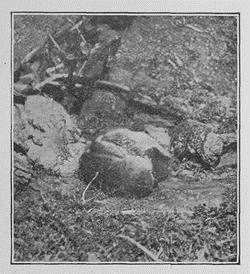
Then They lay Head to Tail, and Tail to Head
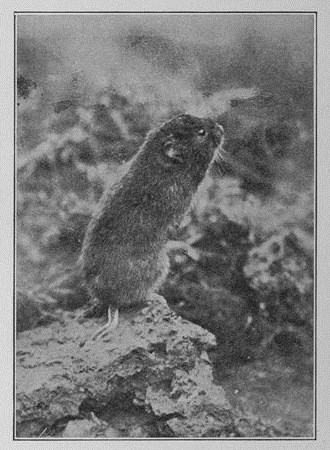
The Field-Voles on the Skirts of it could only see between their Betters' Ears
The brown shrew twisted corkscrew-wise, and landed arched upon his toe points. The grey shrew shot beneath him like a whiplash. Then they lay head to tail, and tail to head. The ring drew closer. The field-voles on the skirts of it could only see between their betters' ears. The bat came to a halt and stared. The Pygmy climbed two inches up, and was rewarded. For now both combatants saw red.
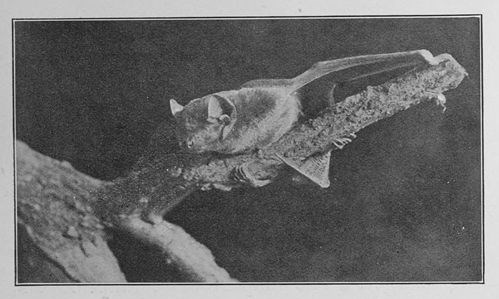
The Bat came to a Halt and Stared
They hurled themselves at random, they bit at random, they bucked and somersaulted, they spun entwined in loops and twists, in double-knotted tangles, in sinuous figures of eight. Now one was on his back and now the other—shrewmice reck little which way up they fight. Now they sped screaming up the trunk and all but reached the Pygmy; now they dropped earthward with twin thud, and grazed a red vole's nose. So without pause or respite. They tore and scratched and gripped and pulled and wrenched and tugged and jumped and squealed until–it was an earthquake, a rounded dull upheaval, a split and crackle of the moss, a sputter of dry dust, and, in the midst, like some queer fungus growth, the mole's red nose.
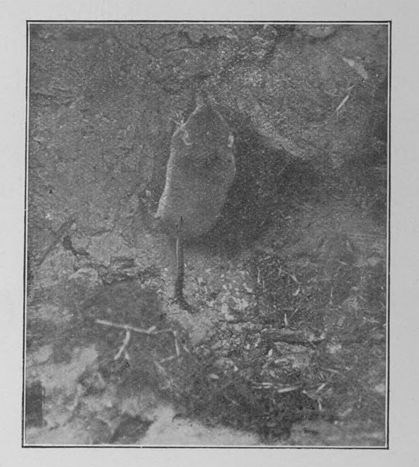
The Pygmy Climbed Two Inches Up
"Flick!" went a woodmouse tail, betokening danger. The amphitheatre emptied in a moment; voles helter-skelter into cover, bat loose into the sky. The Pygmy tumbled earthwards, shot forward, paused, whisked up again, and crept behind a flake of bark.
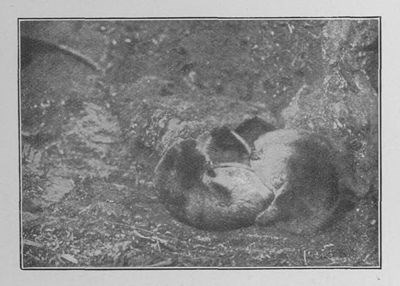
Now One was on his Back and now the Other
The two shrews lay amazed upon their backs, and in between them wagged the intruding nose.
Slowly it lengthened. Two naked paddle-feet passed on the surface, and, like some clumsy fish that quits its element, the mole plunged into air.
He missed both shrews, who, dashing right and left of him, entangled him in double-minded purpose. Rested the Pygmy, shrunk to a rigid wisp of apprehension, ear-straining, muscle-tautened, behind a flimsy screen of bark.
The mole lurched slowly forward, swaying his noddle-head from side to side, nosing each inch of ground. Blood had enticed him upwards, and blood he meant to taste. It seemed as though short measure must content him—a smear upon a grass stem, a drop upon a pebble. But presently his nose flung up; on either side of it the velvet starred, leaving two loop-holes for his pin-head eyes; he snuffed and peered about him; his brush-tail jerked and quivered; a snarl laid bare his teeth; and then, his instinct mastering circumstance, he charged, with swift alternate strokes, straight at the Pygmy's shelter. Had his eye seen? Had his nose smelt? At least he had a visible allurement—a half inch of the Pygmy's tail. The Pygmy curled it promptly, but, even as it moved, the mole was thundering at the bark. The Pygmy squeezed himself a half inch further, and this half inch meant life. The mole had bored his snout into the breach, and by a forward wriggle brought his teeth to bear.
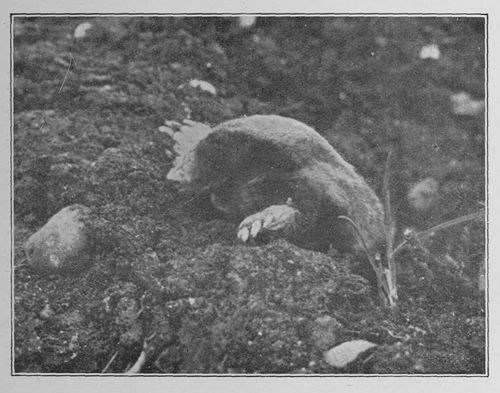
The Mole Plunged into the Air
The outworks broke and crumbled like a biscuit. His nose attained the citadel itself, but here the assault was checked. Strain as he would he could not get fair tooth-hold, for, working upwards in cramped quarters, he spent his strength in struggling for a purchase.
Only exhaustion stays the hunting mole, and such exhaustion ends in death. This mole was not exhausted yet.
He screwed his nose unceasingly, forced his teeth forward line by line, and ground the bark to powder; snatched out his head for air, and thrust his hand in place of it; snatched back his hand and used his jaws once more. Harder and harder still he worked, closer and closer still he drew, until one claw touched fur.
It was a graze, a skin scrape; the fur shrank out of reach, but the mere contact goaded him to frenzy.
He squirmed and writhed and strained until, by muscle strength alone, he forced his head and shoulders through the gap. His nose now touched his quarry, his hands were squared beneath his chin, palms back, and thus, in earth, he might have tunnelled far. But the stiff shell of bark was obdurate.
The white owl helped him out. She caught him at the bottom of her swoop, and loosed him high up on the elm-tree. Here the white owlets welcomed him.
Before she turned, the Pygmy had reached home.
